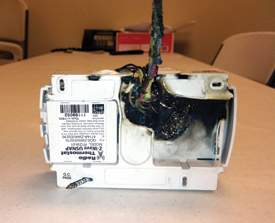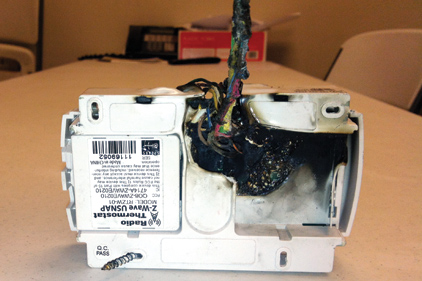Despite vocal opposition from HVAC contractors, Trane, and the Texas chapter of Air Conditioning Contractors of America (ACCA), the Texas House and Senate recently passed a bill that allows licensed alarm system installers to install, repair, or replace thermostats and other temperature control interfaces.

|
| Troy Dassonville, owner of A/C Contractors, Longview, Texas, snapped this photo of a thermostat he said caught fire after being improperly installed in a Texas home by an alarm company. |
The bill — which received significant support from several large home security and automation companies, including AT&T, ADT, and Comverge — will go into effect Sept. 1, once it is signed by the governor.
But the problem, according to industry leaders, is that many of these alarm system installers don’t have the appropriate training or knowledge to properly install or replace a thermostat, which can lead to system inefficiency, HVAC equipment failure, and even fire hazards.
And, with a similar piece of legislation currently making its way through the Michigan House and Senate, many worry the encroachment of home security companies on the HVAC industry may be an emerging — and disturbing — national trend.
Changing the Law
Todd McAlister, executive director for ACCA Texas, said the problems began about a year and a half ago, when he started getting calls from members and contractors who said they were having issues with home automation companies incorrectly installing thermostats.
“All they thought they had to do was plug and play the thermostat,” McAlister said. “What was happening is they were blowing the transformer or blowing the fuse in the furnace or air handler so the blower wouldn’t turn on. The customer was caught in the middle.”
McAlister said they took their concerns to the Texas Department of Licensing and Regulation, then “put together legislation that said, ‘We see the value of home automation, but these installation companies need to be using a licensed contractor to make sure things are the way they’re supposed to be when that thermostat is installed.’”
But AT&T did not like the legislation, and filed their own bill that modifies existing requirements pertaining to HVAC licensure by removing “the installation, repair, replacement, or modification of a thermostat or other temperature control interface” from the definition of “air conditioning and refrigeration contracting.” The change allows alarm system installers who are licensed under the Texas Private Security Act to install, repair, replace, or modify a thermostat.
Though ACCA Texas and others fought the legislation, it passed in both the House and Senate in late May and is currently awaiting Gov. Rick Perry’s signature.
Dangerous Consequences
The biggest problem with the Texas legislation, McAlister said, is that it puts consumers at risk.
“This is bad for homeowners — this is not good for anybody,” he said. “We have a contractor out of Longview, Texas, who sent us some documentation and a picture of an unlicensed contractor who installed the thermostat incorrectly and caught the house on fire.”
McAlister added that, should anything go wrong with the HVAC system because of the thermostat installation, an installer who is not HVAC certified may not notice right away, and if they do, they would be required to call in an HVAC technician to take care of it, anyway.
“You would think that logic would win over, and if a telecom company wants to be in this industry, then they should go get an HVAC license so there’s at least some credibility in what they’re doing,” he said.
Charlie McCrudden, vice president of government relations for ACCA, echoed McAlister’s concerns.
“There are a number of companies that install thermostats that coordinate with the home security system package,” he said.
“The alarm industry is sort of moving from putting in home alarms and building alarms to services that would encroach on energy use of the home.”
He added, “It’s no accident, and I wouldn’t be surprised if we see this popping up in more states.”
AT&T Responds
Rossanna Salazar, spokesperson for AT&T Texas, said her company’s alarm system installers are more than capable of properly installing thermostats as part of AT&T’s new Digital Life wireless home management security system.
“Our authorized digital life technicians are licensed as Texas alarm system installers and must pass a state of Texas background check as a condition of receiving their license,” she said, adding, “It is important to note that Texas homeowners are able to walk into any home improvement or hardware store, buy a thermostat, and change it out themselves.”
Salazar said opponents of the legislation “have made many claims that have confused the policy debate,” especially when it comes to the manufacturer’s warranty on HVAC equipment.
“The issue of licensing has nothing to do with the warranty issue. Just because a homeowner — or anyone — installs a new thermostat does not mean that they will lose or even jeopardize the full warranty on their system. If there is something wrong with the indoor air handler or the outside compressor, it will still be under warranty.”
Salazar added that some manufacturers will not cover damage caused by a third-party component, including an after-market thermostat, regardless of who installed it.
“If a person’s air conditioning system is under warranty, he or she should check to be sure that any new thermostat is compatible with that system,” she said.
Industry Voices Concerns
McCrudden agreed with Salazar that installing improper equipment could void a manufacturer warranty, though he said it is all the more reason to hire a certified HVAC technician.
“Some of the manufacturers do require that the equipment be installed to code or to local law, and if that requires contractors to install the thermostat, that could potentially void the warranty,” McCrudden said. “Also, if you don’t know what you’re doing, you could damage the equipment, or it may cause a fire hazard.”
Francis Dietz, vice president of public affairs for the Air-Conditioning, Heating, and Refrigeration Institute (AHRI), said some of their members are also concerned about the issues that could arise from allowing alarm system installers to install thermostats that are incompatible with the customer’s HVAC system.
“This could be an issue, not necessarily with respect to warranties, but definitely with respect to comfort and energy savings,” Dietz said. “Replacing a thermostat that controls a high-end, multistage unit with a noncommunicating one would likely cause the unit to operate as a single-stage unit, sacrificing comfort and energy efficiency for the homeowner.”
Dietz added that AHRI “would urge consumers who have multi-stage systems, or those that involve add-ons such as humidifiers or dehumidifiers or zoned systems, to consult a reputable service technician prior to allowing anyone to make any changes to their thermostats.”
ACCA Michigan executive director Ron Sandelius, who is currently fighting legislation in Michigan that would allow a registered system provider or licensed security alarm system contractor to install a thermostat without having to obtain a license or permit, said he is also concerned that someone who is not properly trained will not be able to choose the correct thermostat for the system.
“While they may understand how a basic thermostat operates, they may not make the best selection that will provide the most efficient operation of the equipment and its additional related functions, such as humidification, dehumidification, air purification, temperature averaging, and zoning, to mention a few,” Sandelius said.
“If damage occurs due to improper or incomplete selection of the thermostat and its accessories, who will be liable for the repairs?”
Publication date: 7/1/2013
Want more HVAC industry news and information? Join The NEWS on Facebook, Twitter, and LinkedIn today!



Report Abusive Comment